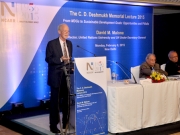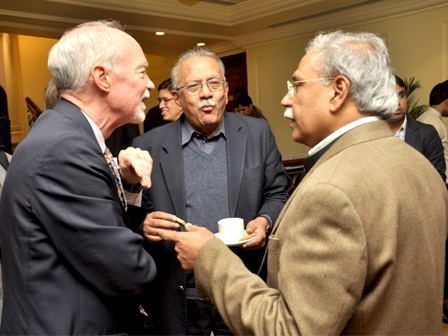Dr David M. Malone, UN Under-Secretary-General and the Rector of United Nations University delivered NCAER’s C D Deshmukh Memorial Lecture on “From MDGs to Sustainable Development Goals: Opportunities and Pitfalls” in New Delhi on February 9, 2015.
The lecture is the third in the series of the C.D. Deshmukh Memorial Lectures, instituted by NCAER in memory of one of India’s most eminent economists and a founding father of NCAER. Previous lectures in this series have been given by Kaushik Basu in 2013 and Arvind Panagariya in 2014.
The UN is working with governments, civil society and other partners to build on the momentum generated by the MDGs and carry forward the ambitious, post-2015 sustainable development agenda, to be adopted by UN Member States at the Special Summit on Sustainable Development in September 2015. In this lecture, Dr Malone outlined some of the salient features of the SDG process to date and the remaining hurdles to be overcome.
Dr Malone discussed the major shifts changes that have taken place globally since the original Millennium Development Goals were formulated. The developing world has been growing rapidly since the early 2000s, particularly Asia and Africa, with a number of major economies emerging as globally significant, including India and China. Concerns over risks arising from climate change have escalated dramatically, and considerations of quality of social services rather than just the numbers of those served have increasingly risen on the agenda. Dr. Malone remarked that unlike MDGs, SDGs are going to be applied to developing and developed countries both, which is a remarkable shift in perspective. Malone highlighted the importance of issues of quality by providing the example of the MDG goal number two on universal primary education, comparing it with the goal of equitable, lifelong and quality education as espoused by SDG goal number four.
Speaking on the occasion, Mr Nitin Desai, former UN Under-Secretary-General commented, “The difference between MDGs and SDGs is that though the MDGs came out as an afterthought, they were the result of a rich political process among UN member countries that preceded their announcement. With the SDGs, there is going to be less room for negotiating numbers.” Dr. Desai also cautioned about putting in too much faith in the target-oriented approach and looking at targets as the main principles of organizing the developmental efforts. He said that reconciling quantity with quality will be a major policy challenge.
About Dr David M. Malone is the Rector of United Nations University and Under-Secretary-General of the U.N. Prior to joining the United Nations University in March 2013, Dr David Malone served as President of Canada’s International Development Research Centre, a funding agency that supports policy-relevant research in the developing world. A world renowned expert on international affairs as well as a career diplomat, Dr Malone is also the former president of the International Peace Institute. He served as Canada’s High Commissioner to India, and non-resident Ambassador to Bhutan and Nepal, from 2006–2008. Malone has published extensively on peace and security issues. His most recent books include Nepal in Transition: From People’s War to Fragile Peace (as co-editor; 2012, Cambridge University Press) and Does the Elephant Dance? Contemporary Indian Foreign Policy (2011, Oxford University Press). Malone has also held research posts at the Economic Studies Program, Brookings Institution; Massey College, University of Toronto; and Carleton University. He holds an MPA from the Kennedy School of Government at Harvard University and a DPhil in International Relations from Oxford University.
About Mr Nitin Desai is one of India’s best-known economists and international civil servants, with an illustrious career with the Government of India and the United Nations. Currently a Distinguished Fellow at TERI, he was UN Under-Secretary-General for Economic and Social Affairs from 1992 to 2003, and earlier the Secretary and Chief Economic Adviser in India. He served as Deputy Secretary-General of the 1992 UN Conference on Environment and Development. After retiring, Desai continued his association with the UN as a Special Adviser to the UN Secretary General for Internet Governance and chaired the UN’s Working Group on Internet Governance. Earlier, Desai has served as a Special Economic Adviser to the Brundtland Commission on environment and development. Desai has been part of several committees of the Government of India. Desai is an Honorary Fellow of the London School of Economics and Political Science and was elected Chair of the Oxfam International Board of Trustees in 2012. He writes a monthly column for the Indian financial daily, The Business Standard.
NCAER instituted the C. D. Deshmukh Memorial Lecture in January 2013 in memory of one of India’s most eminent economists and a founding father of NCAER. Sir Chintaman Dwarakanath Deshmukh was the first Indian to be appointed Governor of the Reserve Bank of India in 1943 and was part of the official Indian delegation to the 1944 Bretton Woods Conference that led to the creation of the World Bank and the International Monetary Fund. He served as the Union Finance Minister during 1950 to 1956 under Nehru and was a founding member of NCAER’s first Governing Body. He later served as Chairman of the University Grants Commission and Vice-Chancellor of Delhi University, during which time he also founded the India International Centre. He was honoured by the President of India with the Padma Vibhushan in 1975. NCAER is privileged to honour the memory of C. D. Deshmukh as part of its own legacy.
Previous C.D. Deshmukh Memorial Lectures:
2014: A Reform Agenda for India’s New Government by Professor Arvind Panagariya
2013: Grassroots Welfare Schemes and Macroeconomic Choices: India’s Dilemmas by Professor Kaushik Basu











